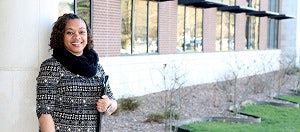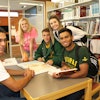Sixty-nine percent of entering students work for pay, while almost one-third work more than 40 hours a week, found a Center for Community College Student Engagement (CCCSE) report, titled “The Intersection of Work and Learning: Findings From Entering Students in Community Colleges,” last October.
The report analyzed the experience of working students, of whom 64% found being a student “equally important” as being an employee.
“You can’t work your way through college anymore,” wrote Dr. Anthony P. Carnevale, director of Georgetown University’s Center on Education and the Workforce, in the report at the time. “Colleges need to do a better job of providing the right support services to ensure their working students have the means to reach graduation and gainful employment.”
Just how to provide support to those student-workers was the topic of a CCCSE virtual panel discussion on Feb. 3, during which administrators from Southcentral Kentucky Community and Technical College (SKYCTC) shared their recent student-worker success efforts.
After the 2008 recession, similar to other postsecondary institutions, SKYCTC experienced an influx of student enrollment due to layoffs.
As companies began to rehire 6-18 months later, the community college aimed to ensure that students received credential attainment before reentering the workforce.
“We as a college, as we were working through all that from 2008 and forward, realized that we needed to make some change or change wasn’t going to happen for these students,” said Dr. Phillip W. Neal, president and CEO of SKYCTC. “And we were going to face some outcomes that we didn’t want to see for our students and for our employers.”
 Brooke Justice
Brooke JusticeFrom that point on, supporting the “working learner” became a focal point for the community college. SKYCTC adopted CCCSE’s mantra of “students don’t do optional.”
As part of that mantra, the school required students to complete orientation and participate in a first-year experience course. Additionally, every semester, students must meet with their academic advisor one-on-one prior to course registration.
“We don’t release students to register themselves,” said Dr. James B. McCaslin, provost at SKYCTC. “They have to have an advising appointment and then we put them in classes that we know they need to make satisfactory academic progress and to meet all the program applicability guidelines.”
Hearing from employers that candidates often lacked work ethic, faculty members at SKYCTC sought advice from industry professionals on ways to incorporate soft skills into the classroom. The workplace ethics program was established thereafter, in which students learn how to behave in a professional environment.
The community college also offers other employer-led curriculum.
“They have the expertise of knowing what is needed right now,” said McCaslin. “As long as we are able to check our own pride at the door and listen to what they have to say, some wonderful partnerships develop out of that.”
Beyond implementing programs, he added that faculty members must be aware of the students they are teaching.
According to the October report, 83% of respondents said their instructors did not know how much they worked per week. Additionally, over 80% of entering students indicated that a “staff member did not help them decide how to balance the number of classes they take with the number of hours they work.”
As a way to detail their daily life and work schedule, SKYCTC students must complete a survey.
“That’s critical in making sure that we incorporate that into the conversation,” said Brooke Justice, vice president of student and organizational success at SKYCTC. “If you do have to get a child off the bus at 2 p.m. in the afternoon, that means that you can’t be in class [then]. We need to have that conversation and determine what it is that is infringing upon your time that you have available to study.”
The panelists also discussed the challenges of balancing both school and work.
 Dr. Phillip W. Neal
Dr. Phillip W. NealThe research found that 17% of entering students had missed class because of work while 26% found it difficult to take necessary courses because of work obligations.
“We try to impress upon our students that you really do have to balance school with your other work and home responsibilities,” said McCaslin. “That is not an easy thing to do. You can’t just say it and expect them to understand it.”
To “meet students halfway,” the college is redesigning courses to accommodate those working students, he added.
Through the “SKY Flex” model, for example, students in advanced manufacturing as well as construction and transportation programs can complete their courses in an online interactive environment. Additionally, those students can sign up for time slots to receive hands-on lab instruction on campus.
SKYCTC also offers mental health services and food insecurity resources, especially during the COVID-19 pandemic.
Wanting to correct the “misbelief” that higher education has not changed its practices in over 400 years, Neil told the panel, “We are really trying to change the way that we are doing things to help people go to work while advancing their skill sets.”
Sarah Wood can be reached at [email protected].



















